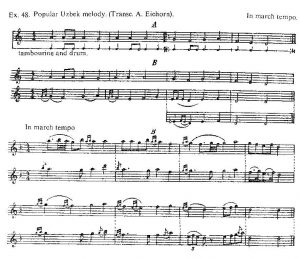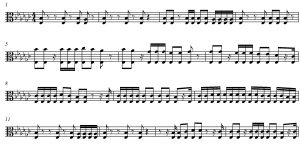So far co-commissioned by[1]:
– The Banda “Asociación Amigos de la Música” de Yecla
– The Dutch Koninklijke Militaire Kapel Johan Willem Friso
– Harmonie Sint Gregorius, Haaren
Dedicated to Ángel Hernández Azorín and the Banda “Asociación Amigos de la Música” de Yecla
There is also a version for fanfare orchestra, Op. 81.
[1] This composition is a crowd funding project. I also wrote a version of it for fanfare orchestra, and for € 250, you and / or your orchestra can become one of the commissioners of either version: you will then be mentioned in this preface to the score as a co-commissioner. If you feel like participating, please contact me at hallo[at]eduarddeboer.org.
Youtube:
Premiere performance by the Banda Asociación Amigos de la Música de Yecla, conducted by Ángel Hernández Azorín, Sunday April 8, 2018 in the Auditorio Victor Villegas, Murcia.
INTRODUCTION
The point of departure for this composition has been Uzbek traditional music. Before starting composing, I immersed myself in the book Ocherki po istorii muzyki narodov SSSR (Essays about the music history of the peoples of the U.S.S.R) by Viktor Beliaev, edited by Mark Slobin. In this book’s chapter about Uzbekistan, I encountered the following fascinating march theme:

In folk tradition, this march was called March of Iskahdar-Khan. In Central Asia, Iskahdar-Khan was the name given to Alexander the Great. This somehow inspired me. In addition, I transcribed a few traditional Uzbek dances from recordings on YouTube. Here is an excerpt from one of them:

The total of these musical ‘ingredients’ led me to write a composition with a rather simple, but at the same time dark and menacing atmosphere. After a relatively slow introduction, the music becomes ever fiercer in a series of successive waves, until a climax is reached, culminating in a few bars of solo percussion. This is followed by a lamenting variant of the march theme, after which the composition reaches a stark conclusion.
Eduard de Boer, December 21st, 2016
Show other settings of: Iskahdar